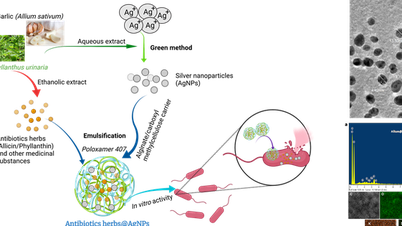Specialist Doctor 2 Huynh Tan Vu, Day Treatment Unit, University of Medicine and Pharmacy Hospital, Ho Chi Minh City - Facility 3, said that figs are one of the oldest plants and a classic fruit in the Mediterranean diet. In traditional medicine, figs are known to improve health, solve problems of the digestive tract, metabolism and cardiovascular system.

For a long time, in traditional medicine, figs have been known to improve health and solve problems related to the digestive tract, metabolism and cardiovascular system.
One small fresh fig (40 grams) contains 30 calories, 8 grams of carbs, 1 gram of fiber, and magnesium, potassium, vitamin B6, vitamin K, and more. Figs have many potential benefits, including promoting digestive and heart health, along with the ability to help control blood sugar levels.
"Fresh figs are rich in nutrients but low in calories, so they are a great choice to supplement a healthy diet," said Dr. Vu.
Promote digestive health
Dr. Vu said figs have long been used as a home remedy or alternative treatment for digestive problems such as constipation. They contain fiber, which promotes digestive health by softening and bulking stools, relieving constipation, and acting as a prebiotic, or food source, for beneficial bacteria in the gut.
Additionally, in animal studies, fig extract or paste has been shown to speed up the passage of food through the digestive tract, reduce constipation, and improve symptoms of digestive disorders such as ulcerative colitis. A study in 150 people with irritable bowel syndrome (IBS) with constipation found that those who consumed about four dried figs (45 grams) twice daily had significantly reduced symptoms including pain, bloating, and constipation compared to the control group.

Figs have many health benefits, however, before using this fruit to treat diseases, you should consult your doctor.
Improve blood vessel and heart health
According to Dr. Vu, figs can improve blood pressure and blood lipid levels, which can improve blood vessel health and reduce the risk of heart disease. One study found that fig extract reduced blood pressure in rats with normal blood pressure as well as rats with high blood pressure. More human studies are needed to better understand the relationship between figs and heart health.
Control blood sugar
A recent study found that beverages containing high doses of fig extract had a lower glycemic index (GI) than beverages without fig extract. This means that these beverages should have a more beneficial effect on blood sugar levels.
Promotes healthy skin
Figs may have some beneficial effects on the skin, especially in people with atopic dermatitis, or dry, itchy skin caused by allergies. A study of 45 children with dermatitis found that a cream made from dried fig extract applied twice daily for two weeks was more effective at treating dermatitis symptoms than hydrocortisone cream, the standard treatment.
Additionally, in one study, a combination of fruit extracts including fig extract was shown to have antioxidant effects on skin cells, reducing collagen breakdown and improving the appearance of wrinkles.
"Figs bring many health benefits and can help treat some common diseases. However, before using this fruit to treat diseases, you should consult your doctor to avoid unwanted side effects," said Dr. Vu.
Source: https://thanhnien.vn/vo-so-loi-ich-cua-qua-sung-doi-voi-suc-khoe-185240926160344907.htm


![[Photo] National Assembly Chairman Tran Thanh Man receives a business delegation from the Europe-ASEAN Business Council](/_next/image?url=https%3A%2F%2Fvphoto.vietnam.vn%2Fthumb%2F1200x675%2Fvietnam%2Fresource%2FIMAGE%2F2025%2F11%2F24%2F1763989198212_ndo_br_bnd-7394-jpg.webp&w=3840&q=75)




![[Photo] Prime Minister Pham Minh Chinh attends the patriotic emulation congress of the banking sector](/_next/image?url=https%3A%2F%2Fvphoto.vietnam.vn%2Fthumb%2F1200x675%2Fvietnam%2Fresource%2FIMAGE%2F2025%2F11%2F24%2F1763981997729_tt-nhnn-jpg.webp&w=3840&q=75)


























![[Photo] Next to the "mountain of trash" after the flood, Tuy Hoa residents strive to rebuild their lives](/_next/image?url=https%3A%2F%2Fvphoto.vietnam.vn%2Fthumb%2F1200x675%2Fvietnam%2Fresource%2FIMAGE%2F2025%2F11%2F24%2F1763951389752_image-1-jpg.webp&w=3840&q=75)










































































Comment (0)